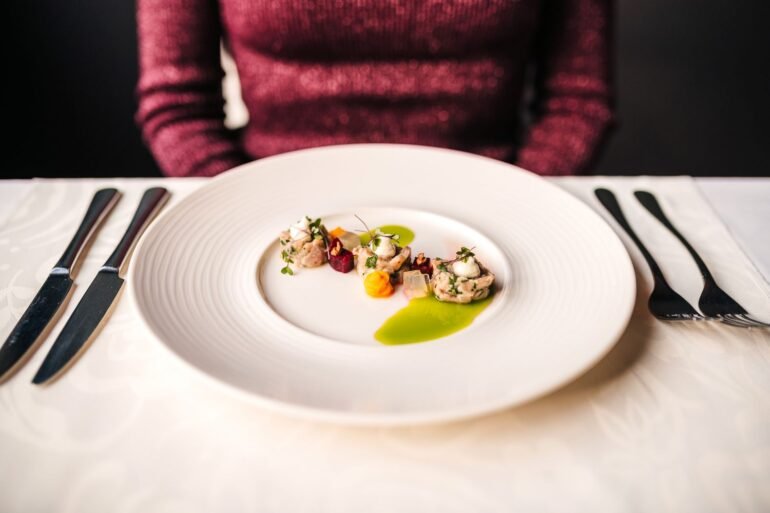:max_bytes(150000):strip_icc():format(jpeg)/Guests-Have-Unreasonable-Expectations-FT-DGTL1125-02-9c50311965f646e2b8309c5ca4fc829b.jpg)
The complaint started off, “Maybe I had watched too many episodes of The Bear, but…” I did not finish reading it because that was all it took to know that this diner had come to my restaurant Francie in Williamsburg, Brooklyn, with unreasonable expectations: a heightened and nearly impossible ideal of what a restaurant can or is expected to deliver.
The author of the screed was a person seeking a combination of hearing Dark Side of the Moon for the first time while hiking the Grand Canyon with the pope. Sorry, but even as the owner, I cannot offer that. What our restaurant can do is serve Michelin-starred food and deliver it with a personal touch in an elegant and unfussy atmosphere. Francie is not necessarily a religious experience. We know who we are, which is a very good restaurant with time limits and budget constraints. This puts us in the company of thousands of other restaurants in New York City and the United States, but not in the company of the fictional restaurants on The Bear.
The list of demands customers make of restaurants is both long and ridiculous. From complimentary Champagne to personal serenades to special accommodation for an emotional support boa constrictor (not joking), nothing seems beyond reason. The equivalent in another industry — say, for me to waltz into Tiffany and ask for something free simply because it is my birthday — is unthinkable, but it is well below par for the requests that people in my position get almost daily.
Diners have unreasonable expectations
Why was I perturbed by this particular complaint? Blame the Will Guidara effect. To be clear, Will is a good friend, but he became a co-producer on The Bear in Season 3 and inspired plot points in Season 2, and many of his philosophies on hospitality have crept into the show — ideas that have become more widespread because of his wildly successful book about service, Unreasonable Hospitality.
Will’s book has sold over a million copies and has had an impact far beyond the restaurant world. Fortune 500 CEOs invite Will to come speak with their leadership teams, and his tactics have been adopted in industries that have nothing to do with traditional hospitality.
The issue is that for most restaurants, save those few that operate on a different astral plane such as the ultra-high-end Eleven Madison Park, where Will built his reputation, “unreasonable hospitality” is difficult to achieve. Still, Will’s dreams were creeping into my reality.
In The Bear, Season 2, Episode 7, “Forks,” (in which the maître d’ character Richie is spotted reading the book) a dramatic moment hinges on a high-end restaurant serving takeout Chicago-style deep-dish pizza to a table of tourists who had not yet tried the local specialty. How did they make that happen? By having enough staff standing around who could identify a group of diners who — gasp! — had never had deep-dish pizza. To blow their minds, a member of the staff places an order, leaves the restaurant to pick it up, then asks a sous chef — who seems perfectly happy to stop serving all the other tables — to plate food from another restaurant in a twee fashion and make it presentable.
If I brought food in from another restaurant and asked my chef to plate it for one of our tables, I would have to duck to avoid the cleaver being thrown at my head. And justifiably so.
But now this is out there, especially among patrons of fine-dining restaurants, so how can real-life restaurants compete with such fictional grand (and sometimes gauche) gestures? What’s next, a naval aerial flyover? Patti LuPone serenading your child’s eighth-grade graduation lunch? Traditional gestures of hospitality will not cut it. Sending an extra appetizer to a table seems quaint, and just forget about the ubiquitous candle in the dessert. And although the episode was a work of fiction, the situation was reality-based — only Guidara and his EMP team famously served a New York City hot dog to a table of European visitors, not a pizza.
Expectations exceeded, and thanks, Will for making this business harder than it needs to be. A year after the episode aired, I received a complaint because my restaurant did not live up to a television show.
I consider myself familiar with a move or two. I have been working in restaurants for over 30 years, and have been an owner since 2014. The chefs and restaurateurs for whom I worked over the years, such as Charlie Trotter and Daniel Boulud, did not take lightly the notion of service being above and beyond their guests’ expectations, and after spending my entire adult life in the industry, I absolutely agreed with them. Service is and should be anticipatory. Gracious hospitality should be on level with the cuisine. Our staff is expected to know what our guests want before they know they want it.
I worked in restaurants where we created custom menus, flew in chefs and sommeliers for special dinners, hosted our regular diners as “guest chefs” in the kitchen, greeted customers on the sidewalk with vintage Champagne as they exited their taxi, and had books written about their approach to service, excellence, and chasing stars, including Lessons in Excellence and The Fourth Star. But sending a member of the staff to Europe to fetch a favorite cheese for a customer? A rumor I had heard, sure. But if accurate, that was a new one on me and a move I could not even hope to replicate.
Hospitality within reason
My talks with Will about hospitality have reinvigorated me to look back to my own experiences in “blowing away” my guests. Of course, unexpected grand gestures are amazing. They are just not realistic, either financially or because of the time and staff involved to make them happen. What I can do is make the past prologue and look inward to my own instincts for gracious gestures. I think of the French painter Eugène Delacroix’s quote, “Talent does whatever it wants to do. Genius does only what it can.” I know enough to work within the boundaries of my own talents.
Digging in my old bag of tricks, I can think of many examples of my own version of unreasonable hospitality: surprise cookies for someone’s child, smuggling a regular’s favorite (illegal) cheese, using my personal glassware, hand-drawings of their wine bottle, a picture with the chef. These gestures are subtle, just not grand. I believe the sum becomes greater than its parts when we do the little things well. Maybe things are not quite as ruined as I let on. Now I just have to get the Blue Man Group to deliver a cake to an unsuspecting diner on table 40.
More Reality Checks From Restaurant Pros
John Winterman
2025-11-03 15:00:00

